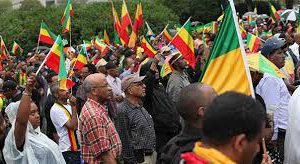BY GIRMACHEW GASHAW
Emigration from Ethiopia is a fairly recent phenomenon that largely began in the 1970s with the Ethiopian Revolution. The Revolution in 1974 led to two decades of conflict and large refugee flows out of Ethiopia. In the 1980s the refugee crises in the Horn of Africa was the largest in the world with over one million Ethiopian refugees residing in the nearby countries of Sudan and Kenya.
The majority of refugees were repatriated to Ethiopia in the 1990s and a small percentage received resettlement in the United States or Europe. In the 1980s Ethiopian refugees were one of the largest groups resettled to the United States, which significantly contributes to the large Ethiopian population in the United States at present.
Today, emigration from Ethiopia continues with both low and highly skilled migrants, but is now focused on economic migration and refugee flows out of Ethiopia are minimal. Although Ethiopia, in comparison to other Sub-Saharan African countries, has a low emigration rate at 0.4%, due to its sheer population size of approximately 110 million people, in absolute numbers it has a large Diaspora community.
The exact size of the Diaspora is unknown but is estimated to be three million people with large populations in the Middle East, North America and Europe. In comparison to other Sub-Saharan Africa countries, Ethiopians are the second largest group in the United States next to Nigeria and the fifteenth largest in Europe.
Nowadays, Diaspora members can offer gains to the countries of origin for economic and social development. The greatest focus in this area has been on international remittance flows, but knowledge transfer programmes and general Diaspora investment is gaining popularity.
Ethiopia has been implementing Diaspora engagement policies and establishing government institutions to engage the Diaspora over the past decade. More recently the government has deployed diaspora diplomats to coordinate the Ethiopians abroad and resolve the difficulties they encounter.
Teramed Adane who has been working as a diplomat for the last 18 years under the Ministry of Foreign Affairs of Ethiopia is one among the 11 diplomats deployed to various countries. This writer found him while he was attending on the job training to serve his country being a Diaspora diplomat.
According to him, the Diaspora diplomat is duty-bound to respect the right and benefit of the Diaspora apart from coordinating them to leave their fingerprints in the ongoing developments endeavours of the country.
If you are assigned to be a Diaspora diplomat, as you are acting independently, the task requires you to participate in several activities. As it is a new experience for me, the training enables me to do tasks effectively via solving the possible barriers encountered while I am operating as a Diaspora diplomat.
Diaspora is a community which has divergent political perception, religious difference and ethnic identity. Regardless of those differences, the Diaspora diplomats needs to promote their national feeling a sense of belongingness and participate in various development activities instead of restraining themselves on a single ethnic identity. Thus, the diplomat is expected to create consensus between the Diaspora communities and coordinate them to support the country they belong to. He was assigned to serve his country being a Diaspora diplomat in Kuwait.
Being a Diaspora diplomat is not new for Yetneberk Belayneh who had served the Ethiopian Diaspora community-based in South Africa. He said, as you all know, the Ethiopian Diaspora have been residing in different countries. In South Africa, for instance, no one can find a free place free from Ethiopians.
The issue of Diaspora is varied as per the tangible situation of the country. If you go to the Arab world, most of the Ethiopia Diaspora works as housemaids. On the contrary, anyone who has a chance to visit the western world, they can find Ethiopians engaging in professional and unprofessional tasks. When returned to South Africa, most of the Ethiopian Diaspora has been engaged in business. Thus, the diplomats should make the Diaspora community alert referring to the tangible situation of the country.
First of all, the diplomats should brief the Diaspora community about the law of the land they reside in to live in peace with others. In collaboration with concerned institutions of the country, the Diaspora diplomat has a responsibility of resolving the problem of citizens. Apart from this, treating all the Diaspora equally is helpful to participate in the development of the country.
The mission of the diplomat in this regard is to feed accurate information to the Diaspora community about his country and raise their awareness towards the incentive they would gain if they are interested to engage in the development activities.
By and large, he/she works to create strong bonds between the Diaspora community and their country. Though all the Diaspora community have many differences, they share the same country and have to harmonize themselves with each other. Support and encourage them to act as diplomats and promote the image of the country.
I am now assigned to serve the Ethiopian Diaspora in Geneva. Ethiopians using the knowledge and expertise they gained so far, have to support their country. Though there are many differences related to political perception, religion, ethnic group, creating consensus among the Diaspora community on national affairs is the duty-bound task given to the assigned diplomat.
In an exclusive interview with the Ethiopian Herald, Agency General Director Selamawit Dawit said that since its establishment her Agency has been able to mobilize sizable amounts of resources through preparing various fundraising programmes aimed at supporting the ongoing development endeavours in the country. If we take the first six months, the Ethiopian Diaspora community bestowed over 2.5 million dollars to assist the national development projects, the Ethiopian Diaspora Agency disclosed.
Accordingly, the Diaspora community has been contributing 48.9 US dollars for the past two and so years she said. Citing the six months performance report of the agency, she said the Diaspora contributed 2,564,102.56 dollars by purchasing bonds and in the form of the grant to assist the effort to finalize the Grand Ethiopian Renaissance Dam and other national development projects, she added.
Apart from fund mobilization tasks, the agency has already deployed Diaspora diplomats to various countries to facilitate conditions to address challenges raised by the Diaspora community to enhance and strengthen Diaspora’s engagement in the national developments projects.
Indicating that Diaspora diplomats and coordinators were sent to foreign countries, they will not be effective in terms of realizing the mission given to them as the agency had not participated in the selection of diplomats. However, the selected Diaspora diplomats are gaining short term training, which enables them to play a catalytic role in bridging the gap between the Diaspora communities, before departure. “In doing so, I hope better changes will come soon.”
The Ethiopian Herald April 25/2021




